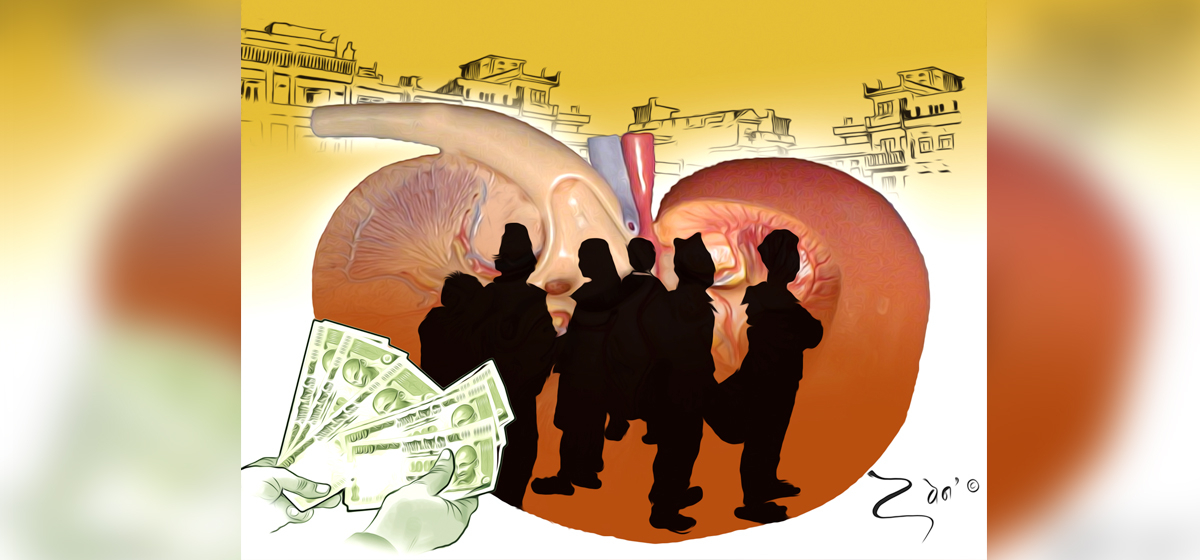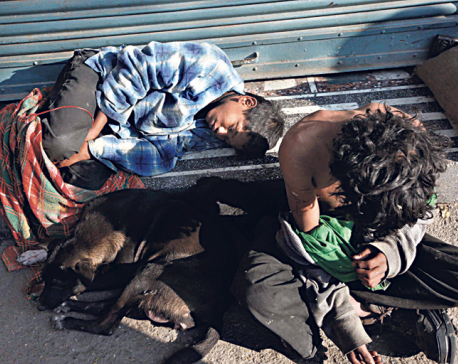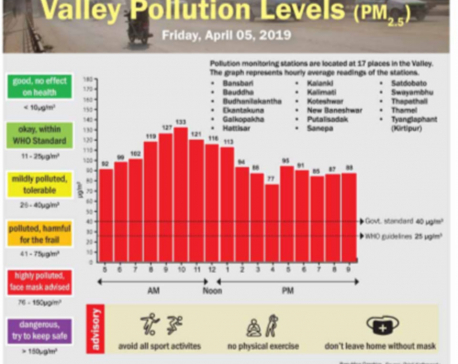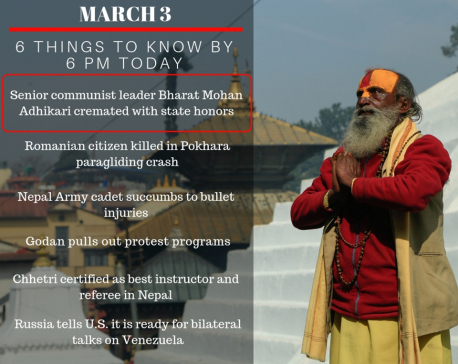
OR

Street children and homeless people are among those extremely vulnerable
KATHMANDU, July 29: Police investigations have revealed that an organized racket is active on the streets of the capital that lure poor and destitute people and take them to India to sell their kidneys. , SP Dan Bahadur Malla at Human Trafficking Investigation Bureau of Nepal Police says, “Thousands of people are dependent on the streets here. As they are destitute and homeless, there is a danger that they easily fall prey to such racket.”
In the first week of June, the Human Trafficking Investigation Bureau of the Nepal Police received information that two teenagers living on the streets of Kathmandu were being prepared to be taken to India to have their kidneys removed. The Bureau started an intensive investigation after receiving the information. Suspicious activity began to appear early in the investigation. Three individuals kept approaching the teenagers.
Those individuals are Dhupendra Shahi, 28, of Chamunda Bindrasayani Municipality-6, Dailekh who currently resides in Kathmandu Kalopul, Bimal Bahadur Shahi, 32, who hails from the same place as Dhupendra but currently lives in Kathmandu Chabahil and Ashish Tamang, 21, known as Chhote of Prithvinagar Municipality-1, Jhapa who currently lives in Madhyapur Thimi Municipality of Bhaktapur.
Out of the three, Dhupendra was involved in taking the teenagers to a polyclinic for regular health check-ups. Bimal and Ashish used to arrange hotel accommodations and food for them. On June 15, the Bureau concluded that their suspicion turned out to be true. Thus, Dhupendra, Bimal and Ashish were arrested by the bureau team. The police team rescued both the teenagers and proceeded with further investigation.
More facts were revealed in the investigation. Two other individuals were also seen behind the scenes. The two individuals were Dhan Bahadur Roka, 28, whose permanent address is Manthali Municipality-5 in Ramechhap and who currently lives in Madhyapur Thimi Municipality, Bhaktapur, and Vijay Kunwar, 31, whose home is in Resunga Municipality, Gulmi, but currently lives in Gaushala, Kathmandu. Dhan Bahadur also identifies himself as Vidhan and Himal Shrestha. After the investigation, they were also arrested by the police on June 28.
Five different roles of the five
According to the bureau, Dhan Bahadur is the gang leader among those arrested. In his plan, four of his people had prepared to take the two teenagers to India for kidney donation. The Bureau's preliminary investigation showed that Dhan Bahadur bargained with the kidney applicants in India, mobilized his associates to find kidney donors according to their demands, took the kidney donors to India and brought the donors back to Nepal after the mission was successful.
According to the instructions of Dhan Bahadur, Vijay had been working to find out the blood group of the kidney donors who came into their contact and identify whether they matched with the blood group of the requester. He also mobilized helpers to find a kidney donor who matched with the blood group of the requester and make arrangements to take them to India. The remaining three are involved in finding kidney donors, recruiting them, arranging meals and taking them for regular health check-ups as per the instructions of Dhan Bahadur and Vijay.
This is how they were being taken to India
According to the spokesperson of the Human Trafficking Bureau, Superintendent of Police (SP) Dan Bahadur Malla, the two teenagers who were lured to India were “street children”. Both teenagers are under 18 years of age. It is seen that the gang tricked the two teenagers into donating their kidneys. It has come to light that they tricked the teenager by saying that a person has two kidneys and that selling one of them did not have any negative effect.
It has been exposed in the investigation of the bureau, that the gang's leader Dhan Bahadur also lived in the streets previously. Research has shown that someone took him to India and removed his kidney a decade ago. “It is seen that Dhan Bahadur tricked the two teenagers by showing the letter that he, himself, had removed his kidney,” said SP Malla.
Dhan Bahadur’s gang kept the two teenagers in a decent hotel in Kathmandu for two months and provided them with delicious and nutritious food and entertainment. According to SP Malla, regular health checkups are necessary after kidney removal. He said, “Health protocols were also followed, and healthy and nutritious food was given to the teenagers to keep their kidneys healthy.”
He said that providing nutritious foods to keep the kidneys healthy did not only fetch a good price but also kept the street-dependent children happy and willing to donate kidneys. After two months of taking them for regular health check-ups, and providing them with healthy and nutritious food, the teenagers were ready to be taken to Kolkata.
“If we had not rescued them, both the teenagers would have probably been in India now,” said SP Malla. The bureau has forwarded the case against all five arrested members of the gang to the District Court of Kathmandu under the Human Trafficking and Transportation (Control) Act, 2064. SP Malla informed that further investigation work was also going on.
A racket looking for a kidney on the street
According to the bureau, other gangs may also be active on the streets of the capital to lure dependents and take them to India to sell their kidneys. “A man who was picked up from the road year\s ago to sell his kidney, is, himself, now involved in the same business,” says SP Malla, “From this, it can be assumed that there are several gangs active in this business.”
He said that the Bureau estimates that there are more than 200 people on the streets of the capital who have had their kidneys removed. It is estimated by the bureau that the gangs lure people of different ages with various inducements and take them from Nepal to different cities in India and make them sell their kidneys. Buying and selling human organs is considered illegal in Nepal.
Section 13 of the Transplantation of Human Body Organs (Regulation and Prohibition) Act, 2055 states that “Organ transplant activities shall not be carried out for the purpose of buying and selling organs or other similar activities.” Section 14 says that " organs can be removed from the human body and transplanted from one human body to another human body only for the purpose of systematically treating the disease following the modern medical system” with the “consent of close relatives of the patient.”
Penalty for harvesting and selling human organs
Harvesting and selling of human organs are defined as crimes by two laws of the Government of Nepal — Human Trafficking and Transportation (Control) Act, 2064 and Human Body Organ Transportation (Regulation and Prohibition) Act, 2055 consider it an offence.
Section 4 sub-section 1 (c) of the Human Trafficking and Transportation (Control) Act, 2064 states that the act of harvesting human organs other than in accordance with prevailing laws is considered to be human trafficking. According to sub-section 1 (c) of section 15, committing this offense is punishable with imprisonment for ten years and a fine ranging from Rs 200 to 500 thousand.
Sections 13 and 23 of the Human Body Organ Transportation (Regulation and Prohibition) Act, 2055 criminalize activities related to organ transplantation for the purpose of buying and selling human organs or other similar activities. If this crime is committed, the punishment includes imprisonment for five years and a fine ranging from Rs 200 to 500 thousand and in case of death of the injured person, the punishment would be life imprisonment.
You May Like This

45 street children rescued from capital
KATHMANDU, Sept 26: National Child Rights Council (NCRC) has rescued a total of 45 street-children from various places of Kathmandu... Read More...

Valley Pollution Index for 6 April, 2019
Valley Pollution Index for 6 April, 2019 ... Read More...

March 3: 6 things to know by 6 PM
Your daily dose of missed important news of the day. ... Read More...









Just In
- Heavy rainfall likely in Bagmati and Sudurpaschim provinces
- Bangladesh protest leaders taken from hospital by police
- Challenges Confronting the New Coalition
- NRB introduces cautiously flexible measures to address ongoing slowdown in various economic sectors
- Forced Covid-19 cremations: is it too late for redemption?
- NRB to provide collateral-free loans to foreign employment seekers
- NEB to publish Grade 12 results next week
- Body handover begins; Relatives remain dissatisfied with insurance, compensation amount








Leave A Comment